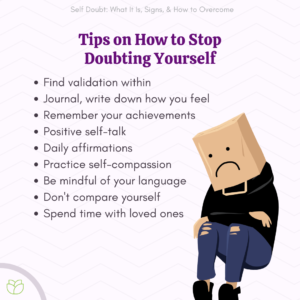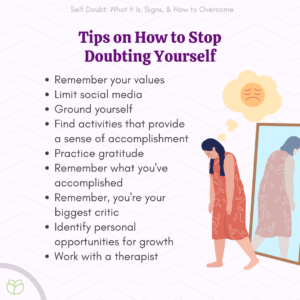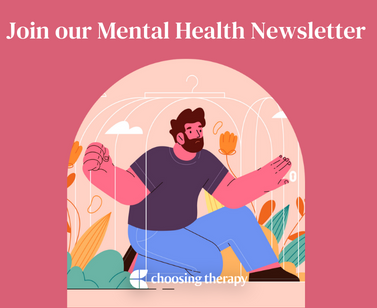Experiencing self-doubt from time to time is natural. We all have occasional doubts about our actions and decisions, and worrying about those things is part of being human. However, if you have prolonged feelings of self-doubt, it can become an issue that impacts many parts of your life. When this happens, self-doubt can become debilitating and stall your personal growth.
A therapist can help you build confidence and self-esteem. BetterHelp has over 20,000 licensed therapists who provide convenient and affordable online therapy. BetterHelp starts at $65 per week. Take a Free Online Assessment and get matched with the right therapist for you.
What Is Self Doubt?
Self-doubt refers to feelings of uncertainty about certain situations, decisions, or aspects of life. It’s normal to feel self doubt and it can stem from things like anxiety disorders, childhood trauma, or attachment disorders. Many times, self-doubt comes from negative childhood experiences, such as constant criticism, bullying, and being berated or humiliated. As you grow, this kind of negative feedback becomes part of your inner monologue.
We begin to internalize these negative comments and believe that we are not good enough. Having severe issues with self-doubt can impact you in many ways, such as leading to low self esteem, lack of motivation, insecurity, people-pleasing tendencies, being passive, and having low self-worth.
Signs you have self-doubt include:1
- Feeling worthless
- Having a loud inner critic
- Imposter syndrome
- Anxiety
- Avoidant attachment
- Insecure attachment
- Being self-critical
- Need for constant approval
- People-pleasing tendencies
- Feeling insecure at work or in relationships
- Low confidence
- Stage fright
- Being “busy” all the time
18 Tips How to Stop Doubting Yourself
Self-doubt issues are hard to deal with, but there are things you can do to move forward from them. First of all, taking time to learn how to build confidence and how to stop being insecure are key components of escaping feelings of self-doubt. It’s also important to find inner validation, practice positive self-talk, and remind yourself of all your achievements.
Here are tips for overcoming self doubt:
1. Find Validation Within
Since self-doubt thrives on a lack of validation, remembering/better understanding who you are as an individual (beliefs, values, strengths, etc.) and improving your relationship with yourself is a good way to overcome self-doubt.
2. Journal
Write down how you feel and what is happening to you. Journaling everything that brings us feelings of self-doubt and self-confidence can be a good way to identify positive and negative patterns. It can also be therapeutic to journal about and reflect on our successes.
3. Remember Your Achievements
Taking time to take inventory of all your accomplishments is a great way to minimize feelings of self-doubt. It can be hard to remember all of our accolades when we’re highly self-critical, but remembering what we’ve gone through and achieved is powerful. It can give us the motivation and empowerment we need to keep moving.
4. Positive Self-talk
We tend to be hard on ourselves and use negative self-talk. It may seem harmless, but if you’re speaking poorly to yourself, it sets up the space to allow that kind of criticism from others. Everyone wants to feel appreciated and loved, so take time to remind yourself that you’re worthy.
5. Daily Affirmations
Reading daily affirmations can help with self-encouragement and stave off feelings of depression in the morning. It sets the stage for your whole day, providing intention that can help build confidence and reduce self-doubt.
6. Practice Self-compassion
This can be challenging as we’re often tougher on ourselves than others; however, it’s important to give yourself the same grace you give to your loved ones. Self-compassion takes time to cultivate, but it can help reduce feelings of self-doubt.
7. Be Mindful of Your Language
Using language that comes from a place of encouragement and optimism is a good way to tackle self-doubt feelings. Practice using positive words and being aware of the negative bias you may have towards yourself. Take conscious steps to use empowering language.
8. Don’t Compare Yourself
Self-doubt often causes us to compare ourselves to others. The goal may be to make us feel better, but it usually just leads to feeling worse. It’s likely everyone has feelings of self-doubt, so keeping in mind that your observation isn’t necessarily a fact is important.
9. Spend Time With Loved Ones
Spending time with people who know and understand you is important for battling self-doubt. Your loved ones can give you the support and validation you need and fill you with hope and positivity. This helps reduce feelings of self-doubt.
10. Remember Your Values
When you are dealing with self-doubt, it can feel like everything you have or do is never good enough. Always remember your values. This is a very rich practice that makes you feel more fulfilled and confident.
11. Limit Social Media
Social media is riddled with images that leave you feeling badly about yourself. Remember, social media is like a highlight reel of people’s lives. It isn’t representative of everything they go through. When you are really struggling with self-doubt, staying off social media will help you keep a clear head.
12. Ground Yourself
When you are dealing with self-doubt, it’s easy to go into a spiral of all the things you are struggling with or feel you cannot do. It’s important to find ways to ground yourself, making sure you stimulate all the senses. Grounding yourself can be physical, mental, or a combination of both.
13. Find Activities That Provide a Sense of Accomplishment
Everyone has something that they’re good at. It may have been a long time since you participated in certain activities, but re-visiting them can bring a sense of self-worth. Knowing you can be successful is a good feeling that can reduce feelings of self-doubt.
14. Practice Gratitude
Take time to practice gratitude. While we are all imperfect and make mistakes, practicing gratitude and believing that as humans we’re allowed to mess up can empower us to feel motivated to do better, grow, and learn from our mistakes.
15. Remember What You’ve Accomplished
To defeat self-doubt, we must take time to revel in our success and praise ourselves for a job well done. When we do this routinely, it can give us the encouragement to keep going despite negative feelings we may have at the moment.
16. Remember, You’re Your Biggest Critic
No one judges you harder than you judge yourself, and self-criticism leads to self-doubt. Grappling with self-doubt can make it easy to avoid social situations, but remember, people tend to worry more about themselves than they do about other people.
17. Identify Personal Opportunities For Growth
Self-doubt can serve as a mirror that shows us what to work on and opportunities for growth. It can be really helpful to use doubts as data to create action items to improve.
18. Therapy
Working with a therapist to uncover underlying issues or undiagnosed mental health conditions is powerful. Therapy helps us view things from a different lens and challenges us to consider alternative perspectives. For self-doubt, therapy can be validating and help us understand both why we have these feelings and where they come from.
How Therapy Can Help
Therapy is a great way to work through feelings of self-doubt and learn where they come from. When you begin to identify these things in therapy, you start to heal and move forward from whatever is holding your back. Therapy for self-doubt can help you learn more about yourself and your experiences in a way that allows you to cope and heal.
Search an online therapist directory to find the right therapist for you. You can get the most out of your therapy by being honest about your reasons for going and the emotions that come up when you’re there.
Final Thoughts
We all deal with feelings of self doubt from time to time; however, there are many ways to manage, cope, and heal from these feelings. Your specific feelings of self-doubt are unique to you, but you are certainly not alone. A therapist can help you learn more about where self-doubt comes from and how to overcome it.
To help our readers take the next step in their mental health journey, Choosing Therapy has partnered with leaders in mental health and wellness. Choosing Therapy is compensated for marketing by the companies included below. Online Therapy BetterHelp Get support and guidance from a licensed therapist. BetterHelp has over 20,000 therapists who provide convenient and affordable online therapy. Complete a brief questionnaire and get matched with the right therapist for you. Get Started Virtual Psychiatry Hims / Hers If you’re living with anxiety or depression, finding the right medication match may make all the difference. Connect with a licensed healthcare provider in just 12 – 48 hours. Explore FDA-approved treatment options and get free shipping, if prescribed. No insurance required. Get Started Reduce Drinking Sunnyside Want to drink less? Sunnyside helps you ease into mindful drinking at your own pace. Think lifestyle change, not a fad diet. Develop new daily routines, so you maintain your new habits for life. Take a 3 Minute Quiz Mental Health Newsletter A free newsletter from Choosing Therapy for those interested in mental health issues and fighting the stigma. Get helpful tips and the latest information. Sign UpAdditional Resources
For Further Reading
Online Anxiety Test A few questions from Talkiatry can help you understand your symptoms and give you a recommendation for what to do next. How Does ERP Help With Intrusive Thoughts? Obsessive compulsive disorder (OCD) is a psychiatric condition marked by the presence of obsessive thoughts, images, doubts, or urges, followed by compulsive behaviors or acts aimed at easing the distress caused by the obsession. While the content of the obsessions can take many forms, they are always repetitive, persistent, involuntary, and intrusive, and they often result in a great deal of anxiety for the person experiencing them.










